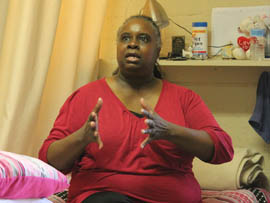Cronkite News has moved to a new home at cronkitenews.azpbs.org. Use this site to search archives from 2011 to May 2015. You can search the new site for current stories.
HERO Initiative seeks to reduce unemployment among veterans
PHOENIX – Since she was medically discharged from the Army in the 1980s, Dorcas Parks held several jobs that lasted a few years each. She lost her latest job in December, and without it she couldn’t afford her apartment.
“That was really hard for me to have to say ‘I’m homeless,’” said Parks, who was a resident of Ozanom Manor, a transitional shelter.
For city of Phoenix officials, too many veterans like Parks face unemployment. Their response is the HERO Initiative, short for Hire, Educate, Recruit, Organize, announced in Mayor Greg Stanton’s State of the City address in February.
In Arizona, unemployment stands at 10 percent among veterans and 27 percent among those who served after 9/11, said Bethany Samaddar, a senior policy adviser for Stanton.
Although Stanton announced the initiative last month, the initiative held its first hiring event in December at the Phoenix Convention Center, Samaddar said.
Before such events, veterans can attend workshops, held at community centers and college campuses, about resume-writing and interviewing.
Samaddar said veterans aren’t always able to explain their skills on a resume or during an interview. With the initiative, veterans can go to workshops to learn how to present their military experience to employers.
“One of the things we hear a lot about is changing military skills to civilian skills,” Samaddar said. “There’s a disconnect between employers and veterans because of the jargon.”
Corey Harris, community relation and government liaison for the Madison Street Veterans Association and an Army veteran, said resume help is important for veterans.
“They’re not trained to write a resume, to sell themselves in an interview,” Harris said. “Helping them write one and sitting down before an interview really helps.”
The Madison Street Veterans Association helped develop the HERO Initiative through its work with homeless and unemployed veterans, Harris said.
Besides offering help with resume-writing, the initiative will host hiring events that match veterans and employers in advance based on skills and needs.
“The mayor likes to call it eHarmony for veterans,” Samaddar said.
David F. Lucier, president of the Arizona Veterans & Military Alliance said the HERO Initiative is one of the best models he’s seen.
“The businesses involved have jobs available for veterans,” he said. “They can’t show up and hand veterans a piece of paper telling them how to apply online for a good appearance.”
Lucier said that veterans, especially young ones, have difficulty entering the job market because they don’t always have the experience for civilian jobs.
He also said some employers have a false impression about post-traumatic stress disorder.
“There’s a Hollywood perception that they might go Rambo because of PTSD, and that’s not true at all,” he said. “It’s a challenge for veterans because it’s not always clear what PTSD is or who it affects.”
Samaddar said that creating the initiative required coordination with the Phoenix Military Veterans Commission and different employers and advocacy groups,
“A lot people feel morally it’s the right thing to do,” she said. “We at the city and the private sector think this is something veterans deserve.”







